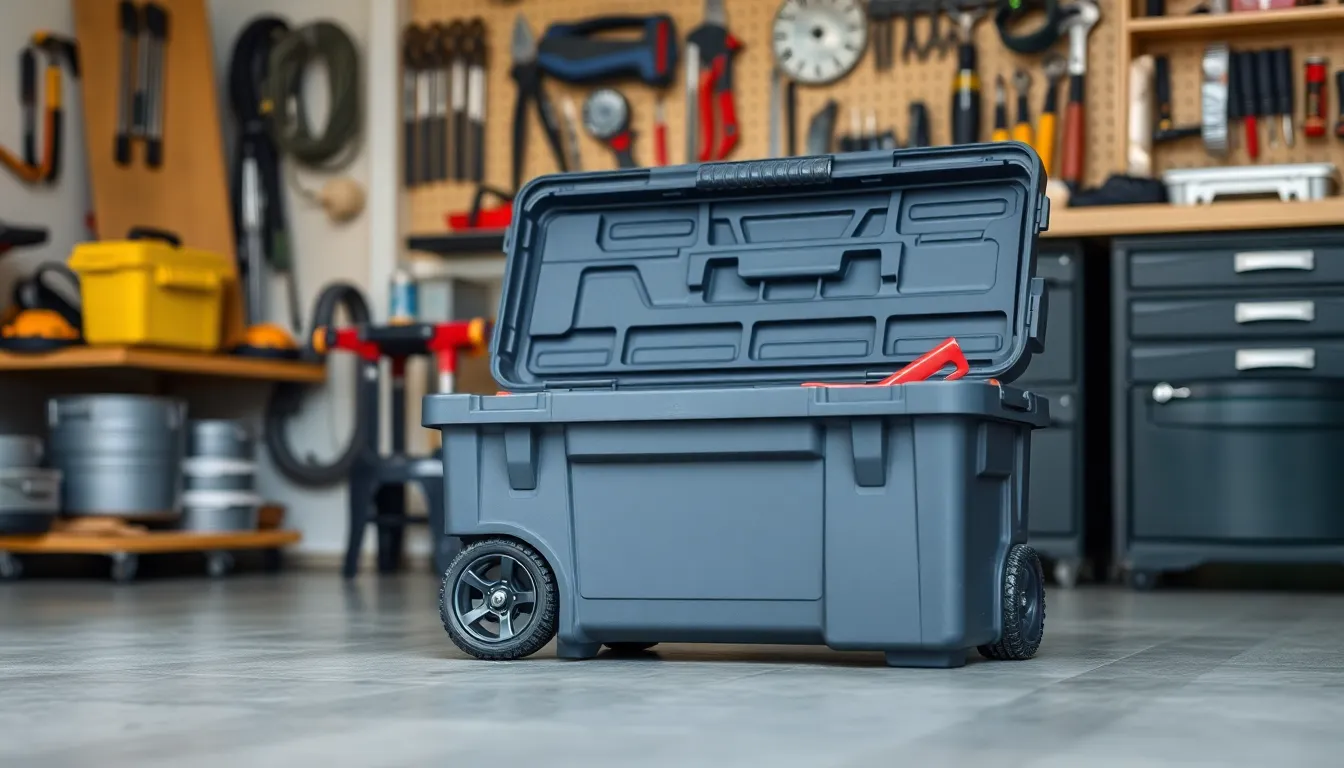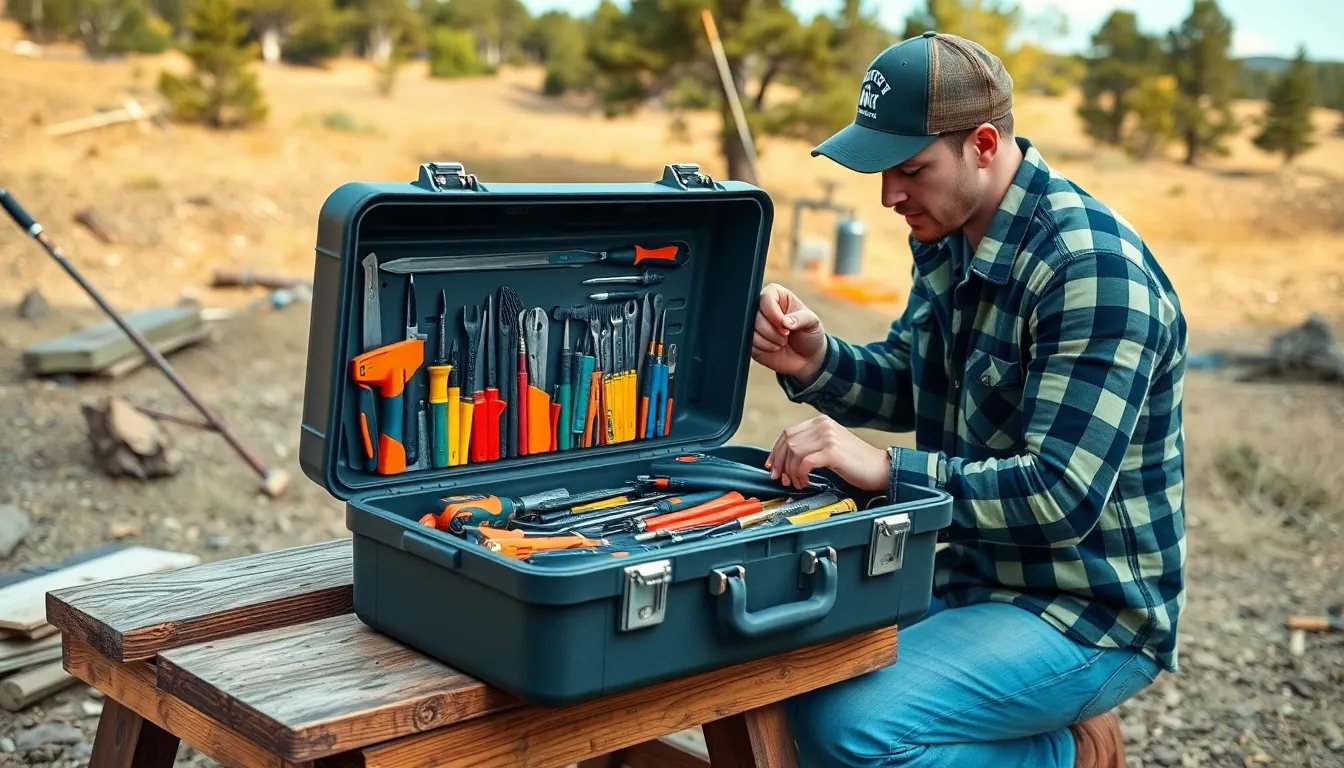Table of Contents
ToggleIn a world where DIY projects and home repairs reign supreme, having the right tools is only half the battle. The other half? Keeping those tools organized and portable. Enter the portable tool box—the unsung hero of every handyman’s or handywoman’s toolkit. With a trusty tool box by their side, they can tackle anything from a leaky faucet to a full-blown renovation without losing their sanity or their favorite wrench.
Imagine this: a tool box that’s not just a box but a mobile command center for all things fix-it. Gone are the days of rummaging through cluttered drawers or losing that one crucial screwdriver. With a portable tool box, they’ll have everything neatly packed and ready to roll. So whether they’re a weekend warrior or a professional tradesperson, it’s time to embrace the convenience and style of portable tool boxes—because who wants to chase after tools when they could be chasing their dreams?
Overview of Portable Tool Boxes
Portable tool boxes serve as vital possessions for both DIY enthusiasts and professional tradespeople. These boxes hold tools, fasteners, and accessories, ensuring quick access during projects. Various designs exist, from compact organizers to larger storage systems accommodating numerous tools.
Sturdy materials, such as steel and high-density plastic, often construct these tool boxes, offering durability. Many feature padded handles for comfortable transport, making them easy to carry from one location to another. Additionally, integrated wheels on larger models enhance mobility, reducing strain during transport.
The organization of tools within these boxes improves efficiency. Inner trays, compartments, and removable dividers offer customizable storage solutions tailored to user preferences. Accurate labeling of compartments helps in locating tools quickly, minimizing downtime on tasks.
Many tool boxes also incorporate locking mechanisms, providing security for valuable tools. Portable models often include water-resistant features, protecting contents from the elements. Some designs even support modular attachments, allowing users to add storage space as needs evolve.
When selecting a portable tool box, consider factors such as size, weight, and intended use. Smaller boxes suit light projects or home repairs, while larger options accommodate extensive tool collections for professional jobs. Understanding these factors contributes to choosing the right tool box for specific needs and enhances overall productivity and organization in various tasks.
Benefits of Using Portable Tool Boxes

Portable tool boxes offer numerous advantages for both DIY enthusiasts and professionals. They enhance productivity while simplifying organization and transport.
Convenience and Portability
Convenience plays a significant role in the appeal of portable tool boxes. These units often feature ergonomic designs that make them lightweight and easy to carry. Integrated wheels and padded handles greatly improve transportability. Many models allow individuals to move from site to site without hassle. Quick access to tools while working on a project saves both time and effort. Compact options fit in tight spaces, making them ideal for storage in small workshops or vehicles.
Organization and Storage
Effective organization ensures tools are easy to find and accessible when needed. Portable tool boxes come with customizable compartments, inner trays, and removable dividers tailored for specific tools. Designs include various sizes to accommodate different collections. Lockable storage ensures valuable equipment remains secure during transit. Additionally, some models offer water-resistant features for protection against moisture and environmental hazards. Efficient organization within these boxes reduces clutter and improves workflow, ultimately leading to more successful projects.
Types of Portable Tool Boxes
Portable tool boxes come in various forms, each designed to meet different needs and preferences.
Plastic Tool Boxes
Plastic tool boxes offer lightweight options for users. Often crafted from durable, high-density polyethylene, these boxes resist impact and moisture. Many designs feature customizable compartments, making organization straightforward. Lockable lids enhance security for tools during transport. Ergonomic handles make carrying easy, especially when moving between job sites. Users appreciate that plastic tool boxes typically cost less than metal counterparts, making them a practical choice for DIY enthusiasts.
Metal Tool Boxes
Metal tool boxes provide robust protection for valuable tools. Constructed from steel or aluminum, these units withstand heavy use in demanding environments. Many feature weather-resistant coatings, enhancing durability against the elements. Storage options often include drawers and shelves for organized tool arrangement. Sturdy locking mechanisms secure tools inside, offering peace of mind on job sites. Users often prefer metal tool boxes for their longevity and resistance to wear and tear.
Rolling Tool Boxes
Rolling tool boxes combine versatility and mobility for easy transport of tools. Equipped with wheels, these boxes allow users to navigate various terrains effortlessly. Many designs include collapsible handles for added convenience. Multiple compartments help keep tools organized, with some models incorporating power tool storage. These tool boxes suit both professionals and hobbyists seeking a transportable solution. Users favor rolling tool boxes for reducing strain when carrying heavy loads.
Features to Consider When Choosing a Portable Tool Box
Selecting a portable tool box involves several key features that influence usability and efficiency.
Size and Capacity
Finding the right size affects tool storage and portability. Compact boxes work well for limited tools or smaller tasks. Larger models offer more space, supporting various tools and accessories. Assessing the capacity ensures that the tool box meets individual project needs. Proper sizing is essential for ease of transportation and accessibility.
Durability
Durability plays a critical role in the lifespan of a tool box. Materials like steel and high-density plastic offer resilience against wear and tear. Weather-resistant coatings act as additional protection against the elements. A robust design withstands impacts during transit, ensuring tools remain secure. Choosing durable options minimizes the need for replacements, offering long-term value.
Security Features
Security features provide peace of mind during transport and storage. Lockable lids and robust latches prevent unauthorized access. Water-resistant designs protect tools from moisture damage. Some models include internal locking compartments for added security. Considering these features enhances the overall protection of valuable tools, crucial for both professionals and DIY enthusiasts.
Top Brands of Portable Tool Boxes
Numerous brands offer quality portable tool boxes, each with unique features catering to various users.
DeWalt is renowned for durable tool storage solutions. Their tool boxes combine resilience with organization, featuring robust construction and a variety of sizes.
Stanley provides reliable options for budget-conscious buyers. Their portable tool boxes often include removable trays and customizable compartments, making organization straightforward.
Milwaukee focuses on professional-grade tool boxes. Their products emphasize durability and weather resistance, ideal for demanding job sites.
Craftsman is a popular choice among DIY enthusiasts. Known for versatility, Craftsman tool boxes often come with integrated organizers and secure locking mechanisms.
Husky offers an extensive range of portable options. Their boxes are designed for heavy-duty use, featuring reinforced handles and modular designs for easy transportation.
Keter stands out with its plastic tool boxes. These lightweight solutions prioritize affordability while still providing practical features like water resistance and stackability.
Ridgid emphasizes mobility and functionality in its designs. Their rolling tool boxes are equipped with ergonomic handles and sturdy wheels, enhancing ease of transport.
Black+Decker caters to home improvement projects and casual users. Their portable tool boxes often include innovative layouts for easy access to tools.
These brands exemplify quality and variety, addressing diverse needs across DIY enthusiasts and professionals. Each one brings distinct advantages, ensuring users find the perfect tool box that suits their requirements.
Portable tool boxes are invaluable assets for anyone involved in DIY projects or home repairs. They not only keep tools organized but also enhance mobility and efficiency on the job. With various designs available from lightweight plastic to robust metal options, there’s a perfect tool box for every need.
Investing in a quality portable tool box can significantly streamline tasks and improve productivity. Features like customizable compartments and durable materials ensure tools remain secure and accessible. As users evaluate their options, considering size, weight, and intended use will lead to the best choice for their specific requirements. Whether for a professional or a weekend warrior, a well-chosen portable tool box makes all the difference.





